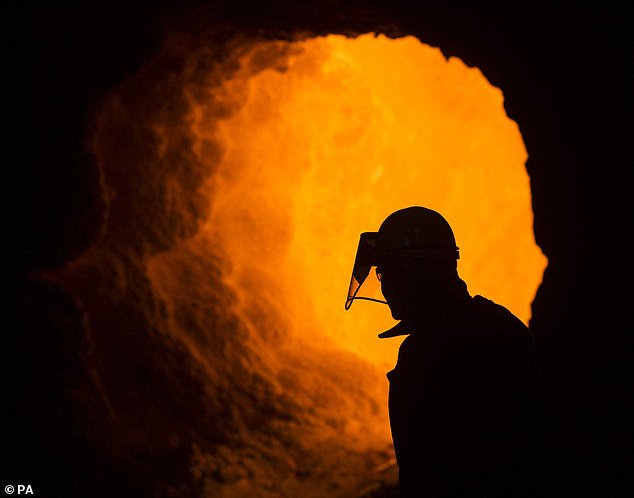Donald Trump is wrong about many things but he was absolutely right when he said in 2018: ‘If you don’t have steel, you don’t have a country.’
Unfortunately, he made his remark in the context of his steel tariffs, which will damage America as well as the rest of the world.
In essence, though, he is correct – no nation can be self-reliant or secure if it does not have a steel industry.
This is the context in which the threat by Jingye, the Chinese owner of British Steel, to shut Britain’s two remaining blast furnaces in Scunthorpe must be seen.
It is an all-too-predictable crisis, one I warned about when Jingye took over, and one I feel personally.
Having been brought up on Teesside, my connections with the industry run deep. My father, my grandfather, my uncles and my cousins were all steelmen.

A proud industry: We need steel to build our new world – for the green energy revolution and for new infrastructure
I have no truck with romanticising heavy industry. These were hard and sometimes dangerous jobs.
But there is huge pride – every Teessider’s boast is that ‘We built the world’ because our steel is everywhere from the Sydney Harbour Bridge to the Yangtze River to Canary Wharf.
We need steel to build our new world too – for the green energy revolution and for new infrastructure. And we need steel for our defence industry in a Trumpian world where the US may not be a reliable ally.
When Chinese conglomerate Jingye agreed a deal to take over British Steel I was filled with misgivings.
It seemed all too convenient that the deal being waved through by the then Conservative government saved jobs in a red wall constituency in the middle of an election campaign.
Airy promises by Li Ganpo, the chairman, to ‘create a splendid future’ were taken at face value.
Now Jingye is asking for £1billion from the Government in subsidies. It has rejected an offer of £500m and the blast furnaces could be turned off within weeks.
It gives me no satisfaction to be proved right, but Jingye was never a suitable owner. If a solution is not found, 2,700
people will lose their jobs and the UK will be the only member of the G7 group of developed countries unable to make its own steel.
Labour says it wants to support the industry. It has pledged up to £2.5billion through the national wealth fund and will produce a strategy later in the spring.
But it will not be easy to reverse decades of poor ownership and neglect, not always of the benign variety.
Steelmaking has suffered from unspoken but nonetheless real cultural contempt.
The works are in places such as Scunthorpe or Redcar, a long way from London and the decision-making elite, in workaday communities.
In an economy that has been dominated by services, finance and retail, steel has been sidelined. The industry is also a victim of green zealotry that has seen environmental levies slapped on to already high energy costs.
It is remarkable we have any steel industry left at all. The fact we do is testament to the resilience of the 34,000 people working in it.
Realisation seems to be dawning that we do need steel after all.
We live in a world where globalisation is in retreat, we cannot rely on cheap imports, and we need to rearm.
Does Labour really want the demise of steel in this country to happen on its watch?
DIY INVESTING PLATFORMS

AJ Bell

AJ Bell
Easy investing and ready-made portfolios

Hargreaves Lansdown

Hargreaves Lansdown
Free fund dealing and investment ideas

interactive investor

interactive investor
Flat-fee investing from £4.99 per month

Saxo

Saxo
Get £200 back in trading fees
Trading 212
Trading 212
Free dealing and no account fee
Affiliate links: If you take out a product This is Money may earn a commission. These deals are chosen by our editorial team, as we think they are worth highlighting. This does not affect our editorial independence.
This article was originally published by a www.dailymail.co.uk . Read the Original article here. .


